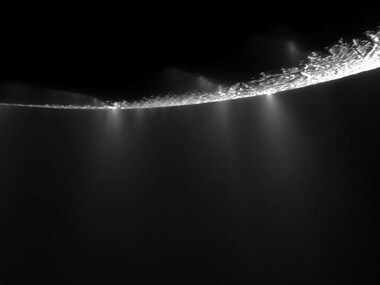Saturn moons Titan and Enceladus have been long considered as possible destinations in our solar system which could harbour microbial life.
Enceladus, in particular, has been known to have water and organic compounds in its plume and a new study has revealed that the satellite could host some species of microbes which have the ability to withstand extreme conditions.

Enceladus. Reuters
As per the study, published in the journal Nature, a microbe called methanothermococcus okinawensis, which is found in areas with extremely hot temperature on Earth could, in theory, survive on the icy moon. These hot places include deep-sea hydrothermal vents and as per the report, the microbe also can convert carbon dioxide and hydrogen gas into methane.
The Cassini spacecraft, which had been tasked to study Saturn, took its leap of death into the gas giant last year. However, before the dive, the spacecraft discovered the presence of methane and dust in the plumes of Enceladus.
The team of researchers tested the microbes survival skills under roughly the same conditions that are present on Enceladus. "Based on our findings, it might be interesting to search for methanogenic biosignatures on icy moons in future space missions," wrote the scientists in the journal.
Simon Rittmann, of the University of Vienna, said in an interview with Space.com, "We were able to show that, under putative Enceladus conditions, biological methane production occurs in the lab. Hence, some of the methane detected on Enceladus could in principle be of biological origin."
However, the findings are not conclusive evidence of the possibility of life on Enceladus.
"Our study only concerns microorganisms. I would like to avoid any speculation about intelligent life," said Rittman in an interview with AFP.
Published Date: Mar 01, 2018 11:57 AM | Updated Date: Mar 01, 2018 11:57 AM



